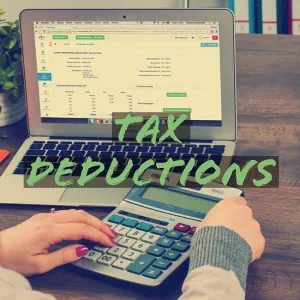Freelancing has become a popular way to earn a living, and platforms like Fiverr have made it easier than ever for creatives to connect with clients. However, if you’re looking to maximize your earnings, it’s essential to understand how the fees work and what you can write off during tax season. In this guide, we’ll delve into whether you can write off Fiverr fees and how to approach tax deductions as a freelancer.
Understanding Fiverr and Its Fees

So, what exactly is Fiverr? It’s a freelancing platform that allows individuals to offer services—referred to as “gigs”—ranging from graphic design to writing, programming, and more. While it’s an excellent way to showcase your talent and attract clients, Fiverr does charge specific fees that affect your overall income.
Here’s a breakdown of Fiverr’s primary fees:
- Service Fee: Fiverr charges a service fee that is typically 20% of the total price of your gig. For instance, if you sell a gig for $100, Fiverr takes $20.
- Withdrawal Fees: When cashing out your earnings, Fiverr may charge a withdrawal fee depending on the payment method you choose. For example, PayPal and bank transfers can incur different charges.
- Currency Conversion Fees: If you receive payments in a different currency, Fiverr might charge additional fees for currency conversion.
As a freelancer, it’s crucial to track these fees, as they can significantly cut into your profits. The good news? Many freelancers can write off these fees as business expenses when it comes time for taxes. However, proper documentation is key to ensuring you can take advantage of these deductions. We'll explore that topic in greater detail later on!
Also Read This: How to Become a Freelance Editor
Tax Deductions for Freelancers

As a freelancer, managing your finances can sometimes feel like walking a tightrope. On one hand, you’re bringing in income and building your own brand, and on the other, you have to keep an eagle eye on your expenses and taxes. Here’s the good news: freelancers can take advantage of several tax deductions that can significantly lower their taxable income.
Essentially, tax deductions are expenses that can be subtracted from your total income to arrive at your taxable income. The less you have to claim as income, the less tax you owe. That’s a win-win! But what qualifies as a deductible expense? Here’s where it gets interesting.
First off, *understanding the IRS guidelines is key. The IRS considers an expense deductible if it is "ordinary and necessary" for your business. This phrase can feel a bit vague, but it basically means that if you need it to do your work, there’s a good chance it’s deductible. Here are a few examples of types of deductions you might be able to claim as a freelancer:
- Home Office Deduction
- Health Insurance Premiums
- Travel Expenses
- Professional Services (accountants, legal fees)
- Business Supplies (software, hardware)
- Marketing Costs
By familiarizing yourself with what you can deduct, you’re taking a vital step toward ensuring you’re not paying more in taxes than you need to. So, always keep tabs on your business expenses because every little bit helps!
Also Read This: How to Start Making Money on Fiverr: A Guide from Reddit
What Expenses Can You Deduct?

When it comes to deductions, the world is your oyster—as long as you’re diligent about tracking the right expenses. Here’s a handy look at what you can typically deduct as a freelancer:
| Expense Category | Examples | Notes |
|---|---|---|
| Office Expenses | Rent, utilities, internet | Only the portion used for business activities. |
| Software/Tools | Graphic design tools, accounting software | Necessary for your trade? Deduct it! |
| Education & Training | Online courses, books | Must relate to your business skills. |
| Marketing Costs | Website hosting, ads | Promotional costs are fully deductible. |
| Travel Expenses | Transportation, lodging, meals | Be sure to keep receipts and logs! |
Remember, it's crucial to maintain records for everything. Receipts, invoices, bank statements—hold onto them like they're your lifeline during tax season. And don’t hesitate to consult with a tax professional if you’re ever in doubt about an expense. Helping yourself stay organized now can lead to significant savings come tax time!
Also Read This: Who Founded Fiverr: The Story Behind the Marketplace
Why Fiverr Fees Qualify as Deductible Expenses
As a freelancer, understanding tax deductions is crucial for saving money and keeping more of your hard-earned income. One of the common expenses you can write off as a freelancer is your Fiverr fees. But why do these fees qualify as deductible expenses? Let’s break it down.
Firstly, the IRS allows freelancers to deduct 'ordinary and necessary' business expenses from their taxable income. Fiverr fees fit this definition because:
- Business Necessity: Using Fiverr is often essential for accessing specialized services, hiring talent, or tools that enhance your productivity. For instance, paying for graphic design, website development, or marketing services are directly related to your business operations.
- Direct Costs: Fiverr fees directly relate to the services you use to conduct your business. If you’re paying for a gig to create content or develop software, those fees contribute to your overall revenue generation.
- Track Record: As a freelancer, you should keep accurate records of these expenses. This not only demonstrates prudent business practice but also makes it easier to back up your claims if the IRS comes calling.
Moreover, the IRS categorizes expenses into various groups. Fiverr fees typically fall under 'Advertising,' 'Professional Fees,' or 'Contract Labor,' which further solidifies their status as deductible costs. So, the next time you throw down cash for a Fiverr gig, remember, you’re not just spending money—you’re making a smart tax move!
Also Read This: Top 10 Software Developers on Fiverr in 2024
How to Keep Track of Your Fiverr Expenses
Keeping tabs on your Fiverr expenses may seem daunting, but it doesn’t have to be. With a few simple strategies, you can streamline your expense tracking process and ensure that you’re well-prepared come tax season.
Here are some tangible methods to help you keep track:
- Create a Spreadsheet: Set up a simple spreadsheet to log your Fiverr transactions. Include columns for the date, amount spent, purpose of the service, and any related notes. This allows you to easily see your spending at a glance.
- Use Expense Tracking Apps: Consider using apps like Expensify or QuickBooks that can automatically track your expenses. Simply sync your bank account or upload receipts, and let the app do the work.
- Keep Receipts: Always save receipts for every Fiverr transaction. Fiverr provides digital receipts that can be easily downloaded right from your account. Store these in a dedicated folder, both digitally and physically, as documentation for your claims.
| Method | Benefits |
|---|---|
| Spreadsheet | Customizable and straightforward; easy to organize |
| Expense Tracking Apps | Automated tracking; less manual entry; good for integration |
| Keeping Receipts | Provides proof of expense; essential for IRS claims |
By utilizing these strategies, you’ll not only stay organized but also maximize your tax deductions, making you a savvy freelancer in the world of gig economy!
Also Read This: Top Fiverr Sellers for Writing and Editing in 2024
Filing Your Taxes: Reporting Fiverr Income and Deductions
When it comes to filing taxes as a freelancer, particularly when you earn income through platforms like Fiverr, it's crucial to get everything right. After all, accurate reporting can help you claim deductions and avoid unnecessary penalties. So, how do you approach this?
First and foremost, any income you earn through Fiverr is considered self-employment income. This means you need to report it on your tax return, typically on Schedule C (Form 1040). Here’s how to break it down:
- Gather Income Documentation: Download your Fiverr earnings reports. These are typically available in your account settings and will help you track your income accurately.
- Track Your Expenses: Keep a record of all the Fiverr fees you've paid, as well as any other business-related expenses like software, subscriptions, or marketing costs. These deductions can significantly lower your taxable income.
- Complete Your Forms: Fill out Schedule C and report your gross income from Fiverr. Subtract your allowed deductions, including Fiverr fees, to determine your net profit.
- Pay Self-Employment Taxes: Don’t forget that you may need to pay self-employment tax, which covers Social Security and Medicare. This is usually calculated on Schedule SE.
Finally, consider consulting with a tax professional, especially if you're unsure about the process or have a complex tax situation. Their expertise can offer peace of mind, ensuring you don’t miss potential deductions or make errors that could lead to fines or audits.
Also Read This: How Do I Sell My Services on Fiverr?
Common Mistakes to Avoid
When navigating the world of tax deductions as a freelancer, it’s all too easy to make mistakes that might cost you time and money. Here’s a rundown of common pitfalls and how to sidestep them:
- Neglecting to Track Income: One of the biggest mistakes freelancers make is failing to keep detailed records of their income. Always document each transaction, including payments received, as this is vital for accurate reporting.
- Overlooking Deductions: Many freelancers miss out on potential deductions simply because they're not aware of what qualifies. Remember to include Fiverr fees, software costs, and even a portion of your home office if you work from home.
- Mixing Personal and Business Expenses: It's essential to keep your business expenses separate from personal ones. Use different accounts for business transactions to avoid confusion when filing.
- Ignoring Self-Employment Tax Implications: Always factor in self-employment taxes. It’s not just about your income tax; make sure you account for those additional taxes that come with freelancing.
- Missing Deadlines: Lastly, missing tax deadlines can lead to penalties. Keep a calendar with important tax dates and set reminders to avoid any last-minute scrambles.
By steering clear of these common mishaps, you can make your freelance tax season much smoother and more efficient. Planning and organization go a long way toward ensuring compliance and maximizing your deductions!
Can I Write Off Fiverr Fees? A Guide to Tax Deductions for Freelancers
As a freelancer, managing finances effectively is crucial to your success. One aspect that often raises questions is tax deductions, particularly around platform fees like those charged by Fiverr. Understanding these deductions can help freelancers minimize their taxable income and retain more of their hard-earned money.
Many freelancers utilize Fiverr for various services, from graphic design to writing and programming. When you hire professionals on Fiverr, there are fees that may be deductible. Here’s a breakdown:
- Fiverr Service Fees: Any fees paid to Fiverr for utilizing their platform can be considered a business expense.
- Transaction Fees: Fees associated with payment processing or transactions can also be deducted.
- Subscriptions: If you have a Fiverr subscription for premium services, these fees may also qualify as deductions.
To take advantage of these deductions, keep in mind:
- Organize Your Expenses: Maintain records of all Fiverr transactions.
- Consult a Tax Professional: Tax laws can vary based on location, so talking to a tax advisor is essential.
- Use Accounting Software:* Software can help streamline tracking your expenses and deductions.
| Expense Type | Description |
|---|---|
| Service Fees | Deductible fees paid for hiring freelancers. |
| Subscription Costs | Fees for premium Fiverr services. |
| Transaction Fees | Fees charged for payment processing. |
In conclusion, Fiverr fees can indeed be written off as business expenses, allowing freelancers to reduce their taxable income and enhance their financial management strategies. Always ensure you keep accurate records and consult with a tax advisor to optimize your deductions.



